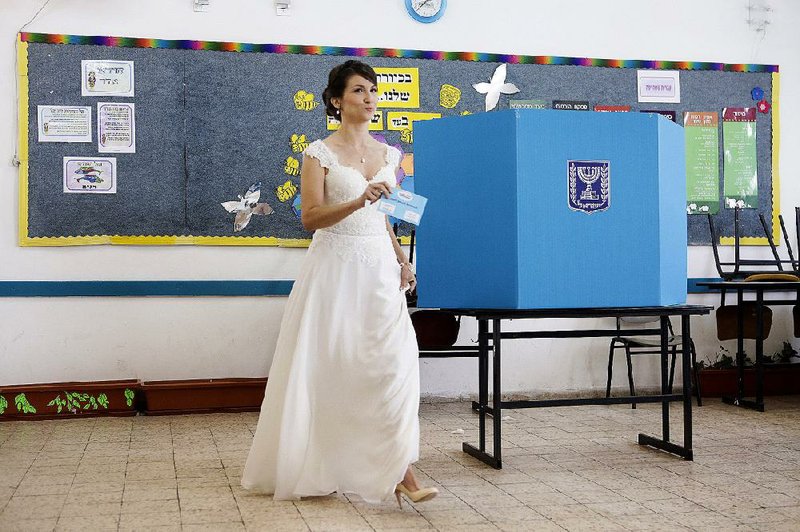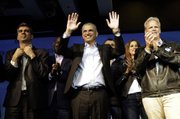JERUSALEM -- Israeli Prime Minister Benjamin Netanyahu declared victory for his Likud Party in parliamentary elections Tuesday, but his chief rival refused to concede as exit polls suggested the race was too close to call.
Official results from Tuesday's election won't be known for several days, authorities said. But two exit polls on Israeli TV showed Likud and the Zionist Union deadlocked with 27 seats each, and a third gave Likud a slight lead of 28-27.
If the parties remain tied or within a single seat once all the votes are counted, that would leave Netanyahu and Isaac Herzog of the Zionist Union competing to create a coalition that commands a majority in the 120-seat parliament, a daunting task in Israel's fractured political landscape.
Herzog said Tuesday that he would not concede defeat to Netanyahu and would make "every effort" to form a coalition.
Netanyahu is expected to attempt to form a governing coalition with the support of rightist and religious parties. Herzog would have to appeal to more ideologically diverse parties.
Either one likely would need the support of Moshe Kahlon, whose new Kulanu Party appeared poised to capture nine or 10 seats. Kahlon, whose campaign focused almost entirely on bread-and-butter economic issues, has thus far refused to take sides.
Israel Radio reported that Kahlon had spoken with Netanyahu and Herzog shortly after the polls closed but said he would wait until the final results were in before announcing whom he would support for the premiership.
"The clearest political outcome is that Kahlon is going to be the kingmaker, and it really depends on how he is going to play his cards," said Yohanan Plesner, president of the Israel Democracy Institute, a nonprofit think tank in Jerusalem.
Early Wednesday, Herzog addressed his supporters, saying he had already begun efforts to court potential coalition partners. In a nod to Kahlon, he said he was committed to forming a "real social reconciliation government."
Herzog also could try to build a coalition that would rely on support from a new Arab alliance that appeared to have captured 12 to 13 seats.
If confirmed, that result would make the Joint List, an alliance of four Arab parties, the third-largest voting bloc in the parliament.
"No one can ignore us," said Joint List Chairman Ayman Odeh, who vowed to prevent a rightist government. "We are in the midst of an historic event."
While Arabs make up 20 percent of Israel's population, Arab parties never have sat in an Israeli governing coalition before. The prospect of more power drew an estimated two-thirds of Arab voters to the polls. In previous elections, about 53 percent of Arabs voted.
Despite the uncertainty of the election's result, celebrations broke out at Likud's campaign headquarters in Tel Aviv as the exit poll results were announced on the nation's three major TV stations.
In a statement released on Twitter, Netanyahu said that "against all odds" Likud had won a "great victory."
"This is a great victory. It's almost a miracle," Likud lawmaker Ofir Akunis said. "For months, everybody attacked the Likud. And today is a beautiful day for the Likud. It sends a message that the people of Israel will decide for themselves."
But Stav Shaffir, a leader of the Zionist Union, called the results a "clear vote of no confidence in Netanyahu."
She said the Zionist Union would wait for the official results before declaring victory or defeat, but she claimed Netanyahu's opponents "have a majority."
The election was widely seen as a referendum on Netanyahu, who has governed the country for the past six years. He focused his campaign on security issues, while his opponents portrayed him as out of touch and focused on the country's high cost of living and soaring housing prices.
A return to power for Netanyahu likely would spell trouble for Mideast peace efforts and could further escalate tensions with the United States.
Netanyahu, who already has a testy relationship with President Barack Obama, took a sharp turn to the right in the final days of the campaign, staking out a series of hard-line positions.
He said he now opposes the creation of a Palestinian state and would not attempt to negotiate a two-state solution if re-elected.
The Palestinians seek the creation of a state on land in the West Bank, Gaza Strip and east Jerusalem -- areas captured by Israel in the 1967 Middle East war. A peace deal between them and the Israelis has been a key policy goal of the White House and the international community.
With no clear defeat of Netanyahu's party in Tuesday's elections, "Israel is not ripe for any peace process," Abbas Zaki, a member of the Palestine Liberation Organization's central committee, told Almayadeen television after voting ended. "The situation is dangerous."
In Gaza, Mushir al-Masri, a senior Hamas official, said the projected election results "clearly show the increase of radicalism in dealing with the Palestinians."
He said the outcome "should be enough to convince the Palestinian Authority and Fatah Party to forget about the choice of keeping up the absurd negotiations, pay attention to the internal unity and reconciliation, and rearrange the Palestinian house instead of betting on a mirage."
Fatah and the Palestinian Authority, which controls the West Bank, engaged with Israel in U.S.-brokered peace talks that collapsed in April. Hamas, which rules Gaza and is considered a terrorist group by Israel and the U.S., has been opposed to negotiations, but the rival Palestinian groups have sought to bury their differences in the past year.
The peace impasse has added to strains between Netanyahu and the U.S., which was unusually critical of Israel's role in the breakdown of talks. Israeli negotiators said Palestinian intransigence was to blame.
Herzog and some other opposition groups accused Netanyahu during the campaign of endangering ties with the U.S., Israel's main ally.
The Palestinians, fed up after years of deadlock with Netanyahu, are now more likely to press ahead with their attempts to bring war-crimes charges against Israel in the International Criminal Court.
"We call upon the international community to support our efforts to join the international treaties and our effort in the ICC," Saeb Erekat, a top Palestinian official, said Tuesday. "What Netanyahu is doing and stating are war crimes, and if the international community wants peace it should make Netanyahu accountable for his acts."
He said the Palestinian leadership will meet Thursday to discuss its next steps.
Netanyahu's switch on a two-state solution comes just weeks after he spoke to a joint meeting of the U.S. Congress at the invitation of Republican House Speaker John Boehner. His visit, which was planned without consulting the White House, has added to the tensions between Israel and the Obama administration.
But Republicans lauded his March 3 address, which warned that an emerging U.S. agreement with Iran would backfire and leave the Islamic Republic with a "vast nuclear" program.
In the U.S. on Tuesday, several Senate Republicans who support Netanyahu's opposition to a nuclear deal with Iran dismissed his about-face on support for a Palestinian state.
"I think it's simply a statement of fact that there's not going to be a Palestinian state," Republican Sen. Tom Cotton of Arkansas said Tuesday.
Cotton recently drafted a letter to the Iranian leadership, signed by 46 of his Republican colleagues, that warned any nuclear deal would fail without congressional support.
Sen. John McCain, R-Ariz., who said he has "always favored" a two-state solution, defended Netanyahu's right to change his mind.
"He's the prime minister of Israel. He's free to take whatever position he wants," McCain said.
Sen. Pat Toomey, R-Pa., portrayed the prime minister as simply stating the obvious.
"There is nobody who has the ability to unify the various factions of Palestinians and be able to deliver on the peace that has to be a condition of a separate state," Toomey said. "And in that absence you can't have the two state solution."
Information for this article was contributed by Josef Federman and Aron Heller of The Associated Press; by Fadwa Hodali, Saud Abu Ramadan, Gwen Ackerman and staff members of Bloomberg News; by Jodi Rudoren, Isabel Kershner and Michael D. Shear of The New York Times; and by Daniella Cheslow of Tribune News Service.
A Section on 03/18/2015






